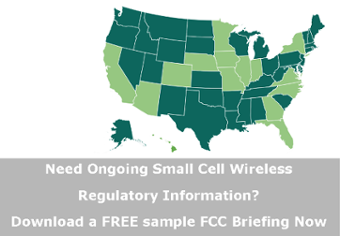 As the state legislative sessions move into full swing, one issue recurs in a growing number of these bodies: legislation aimed at making it easier to install small cell wireless facilities. Over a dozen states have pending legislation that would address this issue, including Arizona, Arkansas, California, Colorado, Florida, Georgia, Hawaii, Illinois, Indiana, Iowa, Minnesota, Missouri, Nebraska, New York, North Carolina and Virginia.
As the state legislative sessions move into full swing, one issue recurs in a growing number of these bodies: legislation aimed at making it easier to install small cell wireless facilities. Over a dozen states have pending legislation that would address this issue, including Arizona, Arkansas, California, Colorado, Florida, Georgia, Hawaii, Illinois, Indiana, Iowa, Minnesota, Missouri, Nebraska, New York, North Carolina and Virginia.
 So, what would these bills do? Most of them are aimed at creating a uniform, statewide process for wireless providers to expeditiously obtain the local authority needed to install these facilities in the public right-of-way. Many attempt to facilitate the permitting process by placing time limits on how quickly applications must be reviewed and approved, adopting presumptions in favor of granting an application, and exempting such applications from zoning review in certain circumstances. Others require that the providers be allowed to seek approval of multiple small cell wireless facilities on a single application for a flat fee. Several bills prohibit authorities from requiring a permit for routine maintenance or the replacement of a wireless facility with another facility similar to or the same size or smaller than the facility being replaced. Some bills would prohibit authorities from requiring that these types of providers apply for or enter into individual license, franchise, or other agreements in order to collocate their facilities.
So, what would these bills do? Most of them are aimed at creating a uniform, statewide process for wireless providers to expeditiously obtain the local authority needed to install these facilities in the public right-of-way. Many attempt to facilitate the permitting process by placing time limits on how quickly applications must be reviewed and approved, adopting presumptions in favor of granting an application, and exempting such applications from zoning review in certain circumstances. Others require that the providers be allowed to seek approval of multiple small cell wireless facilities on a single application for a flat fee. Several bills prohibit authorities from requiring a permit for routine maintenance or the replacement of a wireless facility with another facility similar to or the same size or smaller than the facility being replaced. Some bills would prohibit authorities from requiring that these types of providers apply for or enter into individual license, franchise, or other agreements in order to collocate their facilities.
Several of the proposed bills also seek to address the conditions of an approval. For instance, many limit the fees that may be charged for collocation. Others would prohibit the authority from, in certain instances, requiring an escrow deposit, charging for the collocation of small cell wireless facilities in public rights-of-way, or requiring that the facilities be placed on a specific pole or category of poles. Many require that permits have a term of 10 years and an automatic renewal for up to three successive terms. Some bills even prohibit municipalities from instituting a moratorium on small cell wireless facilities.
Another popular provision prohibits the issuing authority from directly or indirectly requiring the applicant to perform services that are unrelated to the collocation for which approval is sought. This may include restoration work not directly related to the collocation or in-kind contribution to the authority, including reserving fiber, conduit, or pole space for the authority.
Other provisions limit the information or fees an authority may require from an applicant to no more than those it obtains from communications service providers that are not wireless providers, and require that make-ready rules be non-discriminatory (i.e., impose no additional requirements beyond those required of other right-of-way users.)
It’s still early enough in the season that none of the bills have been signed into law, but given the trend, it’s likely we’ll see at least a few of these measures become a reality. TMI continues to monitor these and other industry issues. Watch for more information from us about these legislative developments.



